This page gives details of books and key articles by John Launer. Below that are lists of his articles as a columnist for QJM, Postgraduate Medical Journal and British Medical Journal.
To access articles:
There are open access links on this page to all John’s column articles from QJM and BMJ, and a selection from the Postgraduate Medical Journal. Other articles from 2018-2022 in the Postgraduate Medical Journal are also available on open access if you search for them on Google.
For articles from the Postgraduate Medical Journal between 2008 and 2017, or any from other journals, a Google search will generally give you the abstract, with a link to free institutional access if you are eligible (e.g. via Open Athens). Please contact John if you have difficulty finding the full text of an article.
A full chronological list of John’s academic writing including book chapters appears on the CV page.
Books by John Launer

Reflective Practice in Medicine and Multi-Professional Healthcare brings together around 50 of John’s essays on reflective practice as a themed collection. It covers communication skills, supervision, teamwork and organisational health. It is aimed at a broad readership including community-based GPs, practice nurses and nurse practitioners, pharmacists, physician assistants and paramedics, consultants and registrars across all specialties, communications skills educators, mental health professionals, and health service managers and administrators. You can order from Routledge here (with a 20% discount using code FLE22) or from Amazon here.
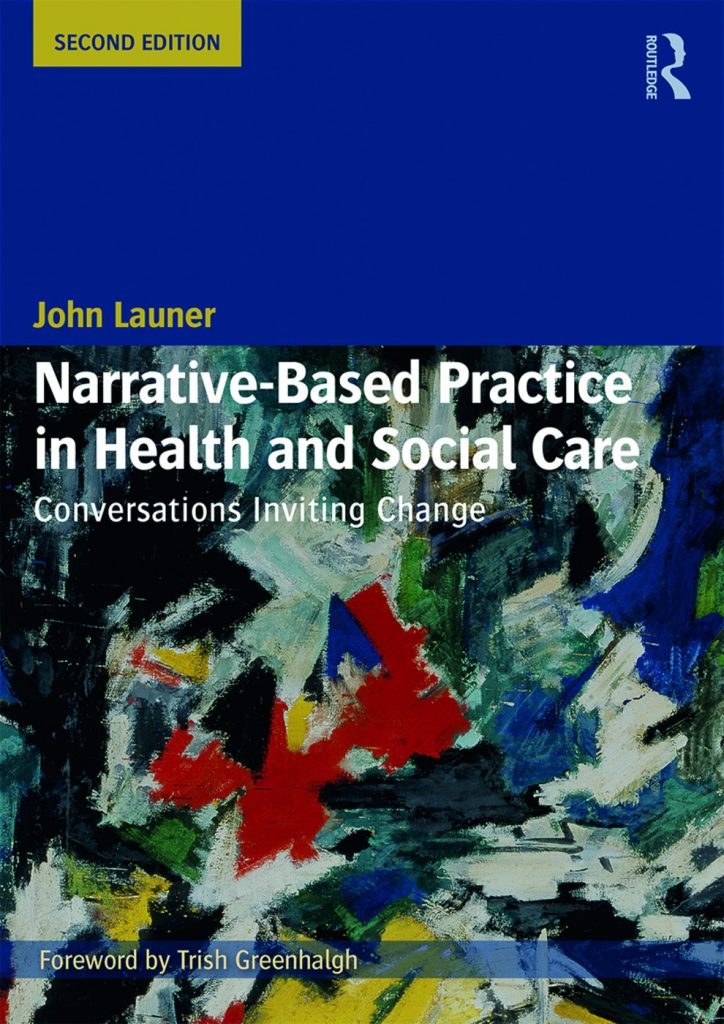
Narrative-Based Practice in Health and Social Care: Conversations Inviting Change is a core text of narrative practice applied to health and social care. Drawing on ideas from narrative studies and family therapy, it provides a theoretical framework and practical skills for dealing with individual consultations, family work, clinical supervision and teamwork. It offers a comprehensive narrative-based approach to the whole range of work in in health and social care. You can order it direct from Routledge here or from Amazon here.
“Reading John Launer’s ‘Narrative-Based Practice in Health and Social Care’ gave me a powerful surge of hope. John finds words to express our deepest thoughts and visions for a truly respectful and effective health care. We all gather, with John as host, in the clearing of a narrative path toward wholeness. If you care for the sick, read this book.”
Professor Rita Charon, Director of the Narrative Medicine programme at Columbia University, New York.
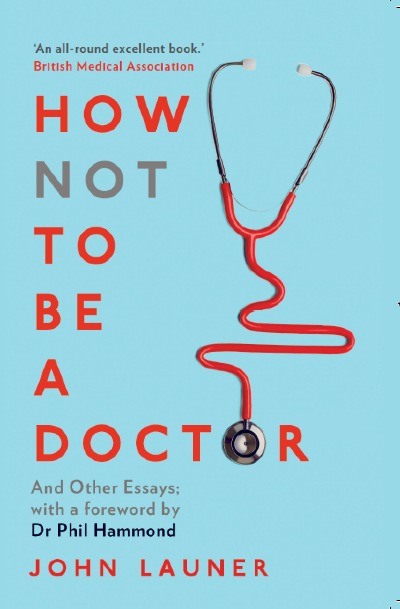
How Not to Be a Doctor: and other essays is John’s award-winning collection of essays. It was originally published by the Royal Society of Medicine Press and was named as a Book of the Year by the British Medical Association. The updated edition published by Duckworth as a hardback, paperback and e-book can now be ordered here.
“Bursting with wonder and wisdom”
Dr Iona Heath, Royal College of General Practitioners
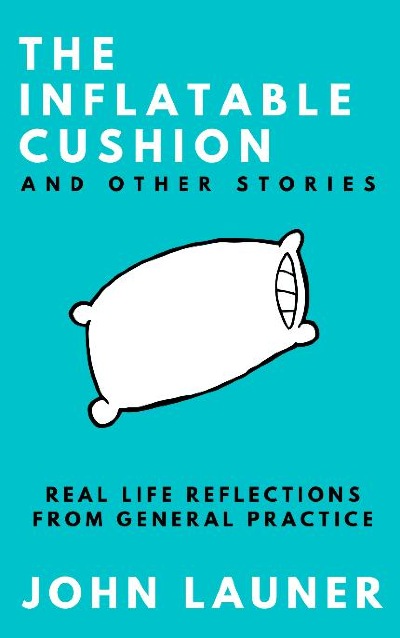
The Inflatable Cushion, And Other Stories: Real Life Reflections from General Practice. To mark the 40th anniversary in 2020 of his first appearance as a medical columnist, John published a selection of essays reflecting on his work as a GP. The book includes tales from everyday practice, as well as humour and political comment. John is donating all profits from the book to support. food banks in the United Kingdom. Order here.
Sex versus Survival: The Life and Ideas of Sabina Spielrein
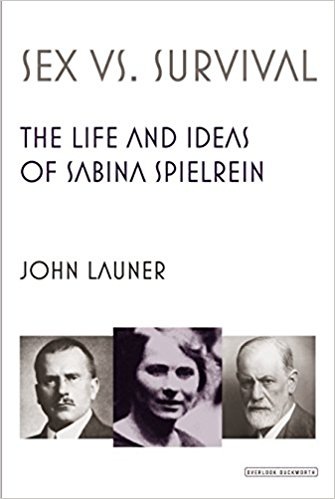
Dr Sabina Spielrein was a Russian psychoanalyst who lived from 1885 to 1942. She is mainly famous on account of her affair with Carl Jung, and for her role in the rift between Jung and Sigmund Freud. However, Spielrein was an original thinker in her own right. She proposed a theory of human sexuality based on the idea that human beings are torn between sexual desire and the drive to survive as individuals. Her ideas anticipated many of the themes of modern evolutionary psychology and child development. This book tells the story of Spielrein’s life, together with a presentation of her ideas. For further information, click on the UK or US edition above. For further details including reviews, click on “Spielrein biography” on the website menu. UK edition US edition
Opening the handbag box: the lives of our grandparents.
John Launer’s Czech grandmother Elsa Lion was one of eleven children but the only one to survive the Second World War. Her own mother and six of her brothers and sisters were murdered in the Holocaust, along with their spouses and children. In a deeply moving memoir that forms the main part of this book, John recreates the story of her life from photos, documents and recollections of those who knew the family. The book also includes an essay celebrating his other three grandparents, Samuel Launer and Moshe and Fanni Bard, who all originated in the province of Galicia in the Austro-Hungarian Empire. The book gives a poignant and fascinating account of John’s Jewish and central European ancestry over several generations before his parents arrived in Britain. Originally self-published for family and friends, this memoir is now on general sale, here.
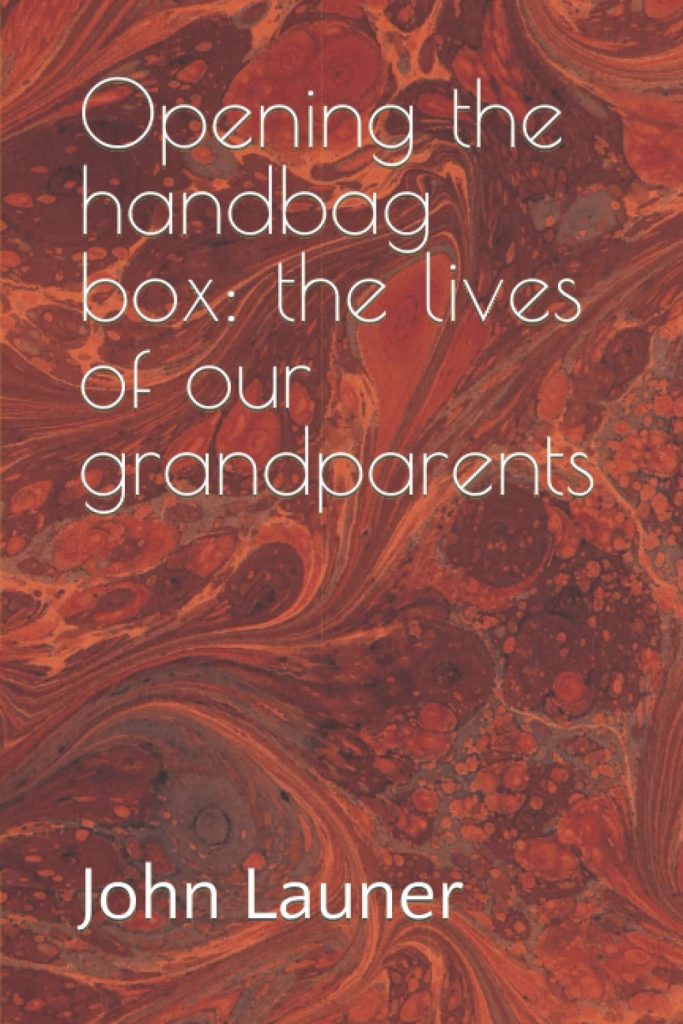
Clinical Uncertainty in Primary Care: The Challenge of Collaborative Engagement (edited with Lucia Sommers)
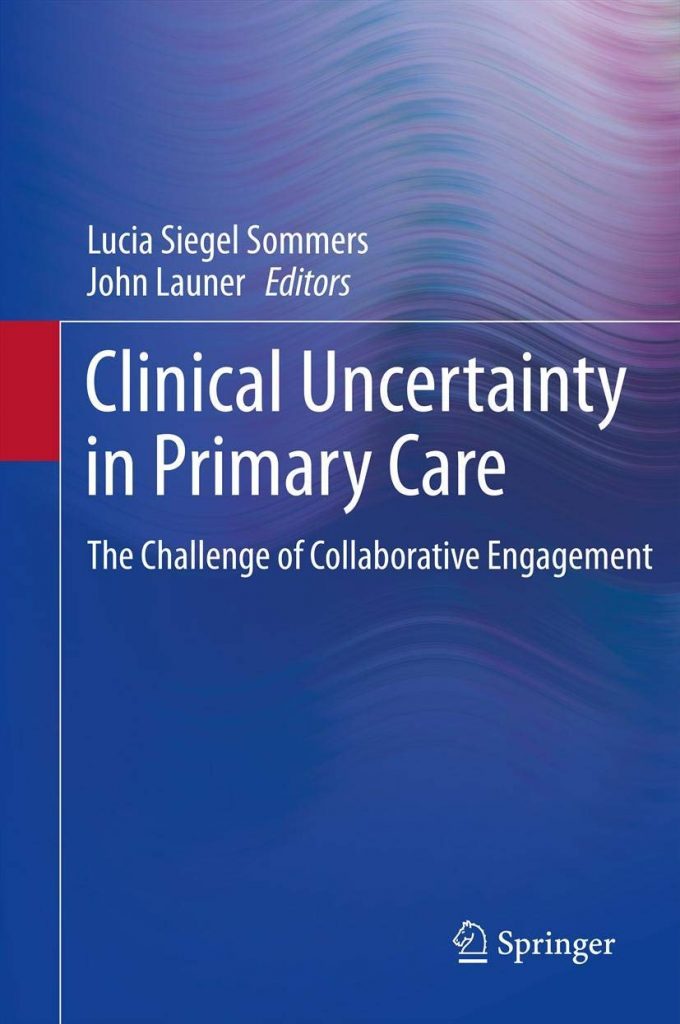
This book examines the whole range of uncertainty in primary care, from the technical to the existential. It makes the case for collaborative peer group supervision as a way of engaging with clinical uncertainty through dialogue and mutual learning. Chapters cover the Balint movement, Practice Inquiry, Narrative-Based Supervision, Problem-Based Small Group Learning, and other models of peer group work from different countries. There is a foreword by Renee Fox, and other distinguished contributors include Trish Greenhalgh, Colin Coles, Charlotte Tulinius and Henry Jablonski. For further information, or to order, click the title above.
Supervision and Support in Primary Care (edited with Jonathan Burton)
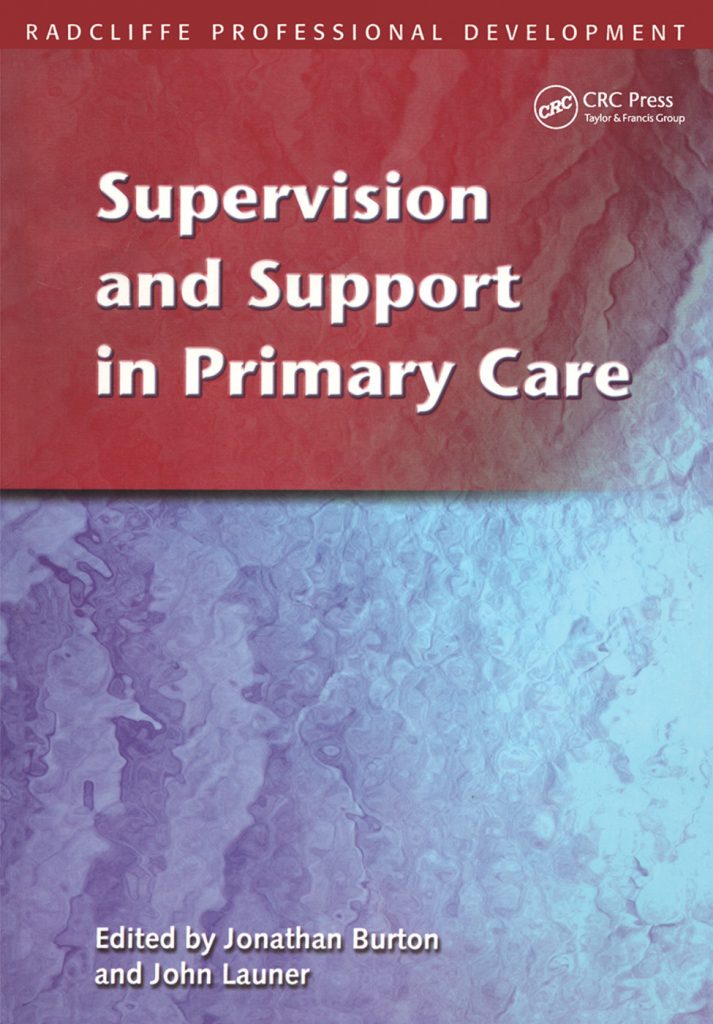
Based on a series of conferences on supervision in primary care, run by the Tavistock Clinic and the London Deanery, this book provides practical information and guidance on the nature and purpose of supervision in a primary care setting. For further information or to order direct from the publisher, click the title above
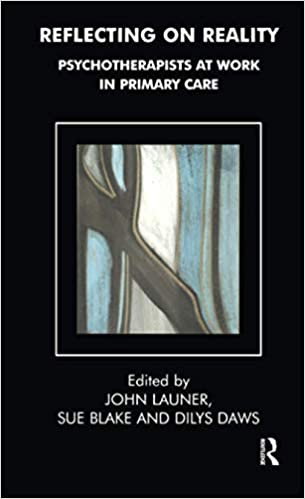
Reflecting on Reality: Psychotherapists at work in primary care (edited with Sue Blake and Dilys Daws)
This book has been written by practising psychotherapists, all connected with the Tavistock Clinic, and with a wide range of experience of working in primary care. It examines how therapists, GPs and other primary care professionals can all learn from each other through clinical collaboration. For further information or to order direct from the publisher, click the title above.
Key articles and chapters
Launer J. A social constructionist approach to family medicine. Family Systems Medicine 1996; 13: 379-389.
Launer J. ‘You’re the doctor, Doctor!’: is social constructionism a helpful stance in general practice consultations? Journal of Family Therapy 1996; 18: 255-267.
Launer J, Lindsey, C. Training for systemic general practice: a new approach from the Tavistock Clinic. British Journal of General Practice 1997: 47:543-456.
Launer J. A narrative approach to mental health in general practice. British Medical Journal 1999; 318: 117-119.
Launer J. Whatever happened to biology? Reconnecting family therapy with its evolutionary origins. Journal of Family Therapy 2001; 23: 155-70
Launer J. Narrative based medicine: a passing fad or a giant leap for general practice? British Journal of General Practice 2003; 53:91-92.
Launer J. Practice, supervision, consultancy and appraisal, a continuum of learning. British Journal of General Practice 2003; 53: 658-62
Launer J. Inattention to primary care: a form of institutional discrimination? Clinical Child Psychology and Psychiatry 2004; 9: 613-616
Launer J. New Stories for old: Narrative-based primary care in the United Kingdom. Families, Systems and Health 2006; 24: 336-344
Launer J. Moving on from Balint: Embracing clinical supervision. British Journal of General Practice 2007; 57: 182-183.
Ahluwalia S, Launer J. Training for complexity and professional judgement: Beyond communication skills plus evidence. Education for Primary Care 2012; 23: 317-319.
Launer J. Managing Bullying, Harassment and Undermining: A Guide to Good Practice in Postgraduate Medical Education in London. Faculty Development, Health Education England, London, 2013.
Ahluwalia S, Launer J. Complexity and uncertainty in health care. Education for Primary Care 2014; 25: 181-183
Gill D, Griffin A, Launer J. Fostering professionalism in the workplace: the role of workplace discussion groups. Postgraduate Medical Journal 2014; 90: 56-70.
Launer J. Sex and sexuality: an evolutionary view. Psychoanalytic Inquiry 2014; 34: 831-846.
Launer J. Carl Jung’s relationship with Sabina Spielrein: a reassessment. International Journal of Jungian Studies 2015; 7: 179-193
Swanepoel A, Sieff DS, Music G, Launer J, Reiss M, Wren B. How evolution can help us understand child development and behaviour. BJPsych Advances 2016; 22: 36-43.
Swanepoel A, Music G, Launer J, Reiss M. How evolutionary thinking can help us to understand ADHD. BJPsych Advances 2017; 23: 410-418.
Wren B, Launer J, Reiss M, Swanepoel A, Music G. Can evolutionary thinking shed light on gender diversity? British Journal of Psychiatry Advances 2019; 25: 1-12.
Shah R, Launer J. Escaping the scarcity loop. Lancet 2019; 394: 112-3.
Shah R, Clarke R, Ahluwalia S, Launer J. Finding meaning in the consultation: introducing the hermeneutic window. BJGP 2020; 70: 502-3.
Wren B, Launer J, Music G, Reiss MJ, Swanepoel A. Can an evolutionary perspective shed light on maternal abuse of children? Clinical Child Psychology and Psychiatry 2021;26:283-294.
Shah R, Clarke R, Ahluwalia S, Launer J. Finding meaning in the consultation: working in the hermeneutic window. British Journal of General Practice 2021;71: 282-283.
Shah R, Clarke R, Ahluwalia S, Launer J. Finding meaning in the consultation: supporting the hermeneutic window in practice. British Journal of General Practice 2022; 72: 82-83.
Launer J, Wohlmann A. Narrative medicine and narrative practice: partners in the creation of meaning. Lancet 2023;401:98-99.
Launer J. Supervising the traumatised practitioner. In: Rasmussen AJ, Sodemann M. Narrative Medicine: Trauma and Ethics. Wilmington, DE: Vernon Press, 2024.
Launer J, Jameel S. A call for education against hatred. Lancet 2024; 403: 2684-5
Foell J, Launer J. Narrative means to normative ends: story-centred practice in statutory contexts. Lancet 2024; 406: 1080-1081
Coda articles from John’s column in QJM
The condition of music (January 2002)
The professor of cheese (February 2002)
Darwin’s dangerous idea (March 2002)
What’s in a name? (April 2002)
A house divided (May 2002)
Seeing double (June 2002)
The art of questioning (July 2002)
Rhythms of life (August 2002)
Hot water (September 2002)
Interpreting illness (October 2002)
Plus ça change (November 2002)
Close encounters (December 2002)
All doctors are liars (January 2003)
Mentioned in passing (February 2003)
The National Illness Service (March 2003)
Doing the rounds (April 2003)
All Greek to me (May 2003)
It takes two (June 2003)
Welsh blood (July 2003)
Uniqueness and conformity (August 2003)
The wrong trousers (September 2003)
The refugee’s tale (October 2003)
Folk illness and medical models (November 2003)
Minding the body (December 2003)
Escaping the loop (January 2004)
Cultural nepotism (February 2004)
Dr Scrooge’s casebook (March 2004)
Rhyming couplet (April 2004)
Yellow nose sign (May 2004)
The itch (June 2004)
A magical mystery tour (July 2004)
Impaled on the invisible (August 2004)
Fathers and sons (September 2004)
Of cheese and choice (October 2004)
Unspeakable (November 2004)
Modern medicine (December 2004)
The medics of Myddfai (January 2005)
Secrets of the willow (February 2005)
Let’s talk about sex (March 2005)
Dialogue and diagnosis (April 2005)
Breaking the news (May 2005)
Anna O and the ‘talking cure’ (June 2005)
Bigger picture, lighter touch (July 2005)
Diaspora and coincidence (August 2005)
Careers advice (September 2005)
The many faces of David (October 2005)
Stressing the other (November 2005)
Mysteries of the male (December 2005)
Crusades and mirages (January 2006)
How not to be a doctor (February 2006)
Personal services (March 2006)
The descent of man (April 2006)
Weasel words (May 2006)
Sexual politics (June 2006)
A hitch-hiker’s guide to the past (July 2006)
The enduring asylum (August 2006)
Do not disturb (September 2006)
Maps and meanings (October 2006)
Burning your relatives (November 2006)
Organizational health (December 2006)
Transported (January 2007)
Passing on (February 2007)
Only obeying orders (April 2007)
Impact factor (May 2007)
A suitable case for treatment (June 2007)
Hansen’s disease (July 2007)
The art of not listening (August 2007)
Personal risk (September 2007)
The problem with sex (October 2007)
The illusion of compassion (November 2007)
From the depths (December 2007)
End of the road (January 2008)
On Reflection articles from John’s column in the Postgraduate Medical Journal
A selection of open access articles appears below, followed by the complete list from 2008-2022. For details of access to all the articles, see the information at the top of this web page.
A selection of open access articles:
Effective clinical conversations: the art of curiosity
Digging holes and weaving tapestries
Is taking a history outmoded? Why we should listen to stories instead
The Yin and Yang of medical consultations
Teaching and facilitating groups online: adapting to the COVID-19 pandemic
Why metaphors matter: the semantic determinants of disease
Full list of articles in Postgraduate Medical Journal 2008-2022
Conversations inviting change (January 2008)
Medical kitsch (February 2008)
Rise and fall (March 2008)
A day out with Darwin (April 2008)
The facts of death (May2008)
Disappointment-ology (June 2008)
Care pathways (July 2008)
Thinking in three dimensions (August 2008)
Learning humanity (September 2008)
The magic of medicine (October 2008)
Making meaning (November 2008)
On kindness (December 2008)
Death by negligence (January 2009)
Capable but insane (February 2009)
Why narrative (March 2009)
The foreknowledge of extinction (April 2009)
Power and powerlessness (May 2009)
Super Vision (June 2009)
Who owns truth? (July 2009)
In our name (August 2009)
Medically unexplored stories (September 2009)
The three second consultation (October 2009)
A beginner’s guide to sex (November 2009)
Young at heart (December 2009)
Double binds and strange loops (January 2010)
The many faces of professionalism (February 2010)
Home truths from abroad (March 2010)
Right on cue (May 2010).
The big picture (June 2010)
On the record. 2010 (July 2010)
Taking risks seriously (August 2010)
Making time for partnership (September 2010)
Unconscious incompetence (October 2010)
Supervision as therapy (November 2010)
What is an emergency (December 2010)
Why do men have nipples? (January 2011)
Family matters (June 2011)
Three kinds of reflection (July 2011)
What is good supervision? (August 2011 with Sue Hogarth)
A Twilight Adventure (September 2011)
Selfish genes and reproductive fitness (October 2011)
The genius of Sabina Spielrein (November 2011)
The end of health (December 2011)
Monument to the Discoveries (January 2012)
Narrative diagnosis (PMJ February 2012)
Supervision quartets (March 2012)
Dumpling soup (April 2012)
Being wrong (May 2012)
Waiting rooms and the unconscious (June 2012)
Close readings (July 2012)
The birch field (August 2012):
Spams and spamnals (September 2012)
Brief encounter (October 2012)
Odyssey (November 2012)
Therapeutic dialogue (December 2012)
Brainfulness (January 2013)
On redundancy (February 2013)
Doctors as victims (March 2013)
In praise of deaneries (April 2013)
Bullying in the health service (May 2013)
Meet your microbiome (June 2013)
Developing your faculties (July 2013)
Opium (August 2013)
First Australians (September 2013)
The end of the NHS (October 2013)
The age of Twitter (November 2013)
What’s wrong with ward rounds? (December 2013)
Meetings with teams (January 2014)
Good questions (February 2014)
Rediscovering the unconscious mind (March 2014).
Darwin for doctors (April 2014):
Medicine as poetry (May 2014)
When will we learn to love complaints? (June 2014)
Do diseases really exist? (July 2014)
Patient choice and narrative ethics (August 2014)
Of human bondage (September 2014)
In praise of libraries (October 2014)
The science of compassion (November 2014)
The breathtakingly simple facts of life (December 2014)
Creative subversion (January 2015)
Monkey business (February 2015)
Concentric conversations (March 2015)
Medicine under capitalism (April 2015)
Memories of the workhouse (May 2015)
What’s the point of reflective writing? (June 2015)
Setting the facts straight on Wikipedia (July 2015)
Collaborative learning groups (August 2015)
Why should doctors look at art September 2015)
In celebration of medical essayists(October 2015)
Guidelines and Mindlines (November 2015)
Resilience: For and against (December 2015)
The case of Emma Eckstein (January 2016)
Clinical gist (February 2016)
Epigenetics for dummies (March 2016)
Clinical case discussion: using a reflecting team (April 2016)
Rudeness and respect in the health service (May 2016)
The hospital drawings of Barbara Hepworth (June 2016)
Reinventing palliative care (July 2016)
Coaching and health (August 2016)
A life on the wild side (September 2016)
Giving feedback (October 2016)
Humour in health care (November 2016)
The career of William Osler (December 2016)
Crisis in clinical consultations (January 2017)
Doctors and the prevention of nuclear war (February 2017)
Have you considered taking up smoking (March 2017)
Reducing futile attempts at CPR (April 2017)
Masterpieces from the Middlesex Hospital (May 2017)
Patients as ethnographers (June 2017)
Heart failure- or failure of imagination? (July 2017)
Henry Wellcome: the man who made medicine (August 2017)
Why doctors should draw genograms (September 2017)
Hunting for medical errors (October 2017)
The first pacemaker (November 2017)
Socratic questions and frozen shoulders (December 2017)
“Dying”: what doctors can learn from fiction (January 2018)
Sexual harassment of women in medicine (February 2018)
Whatever happened to silence? (March 2018)
Managing the threat to reflective writing (May 2018)
Frida Kahlo and her doctors (June 2018)
Peculiar health beliefs of the Nacirema (July 2018)
Interprofessional supervision (August 2018)
Doctors as migrants (September 2018)
Complexity made simple (October 2018)
How are you hoping to die? (November 2018)
Encounters with the Stone Age (December 2018)
Climate change: beyond denial and grief (January 2019)
#Docsplaining (February 2019)
Dr Jekyll and Mr Hyde (March 2019)
In defence of appraisal (April 2019)
The serial killer who confessed (May 2019)
Passion for walking (June 2019)
Tribute to Tredegar (July 2019)
he blessings of fungi (September 2019)
Yin and Yang (October 2019)
Van Gogh’s ear (November 2019)
Equanimity 2020 (December 2019)
Identical strangers (January 2020)
White supremacism (February 2020)
Production of ignorance (March 2020)
Half a mile of medicine (April 2020)
Digging holes and weaving tapestries (May 2020)
Burnout in the age of COVID-19 (June 2020)
Why we need to ask adults about childhood (July 2020)
Why you should talk to yourself (August 2020)
Medicine and the art of trade-offs (September 2020)
Red Beard (October 2020)
Effective altruism (November 2020)
Music, religion and sex (December 2020).
Against diagnosis (January 2021).
Churchill and his illnesses (February 2021).
I want to see the consultant (March 2021).
Evolutionary and narrative medicine (April 2021).
Art of curiosity.(May 2021).
Anaesthetists and wicket keepers (June 2021).
Ear wax (July 2021).
Teaching online (August 2021).
Medical activism (September 2021).
Hemlock and hemlock poisoning (October 2021)
The sick child: a portrait of tragedy and grief (November 2021)
Light and gravity: can the full moon really make you go mad? (December 2021)
Divine bodies: imagining the anatomy of God (January 2022)
Dr Ernesto Che Guevara: a study in moral ambiguity (February 2022)
Is taking a history outmoded? Why we should listen to stories instead (March 2022)
‘An enemy of the people’. Doctors as scapegoats. (April 2022)
Denial, distress and hope: why we need to talk about nuclear war (May 2022)
Elizabeth Packard and Charlotte Perkins Gilman: Two ‘mad’ women and the doctors they defied (June 2022)
Two hearts that beat as one: does love cause physiological synchrony? (July 2022)
Dealing with difficult patients – by dealing with difficult doctors (August 2022)
How to avoid getting COVID-19: a guide for the perplexed (September 2022)
Why metaphors matter: the semantic determinants of disease (October 2022)
Learning from the Black Death (November 2022)
A fortunate writer: reflections of a medical columnist (December 2022)
Talking Point articles from John’s column in the British Medical Journal
Proud to be woke (14 September 2022)
The art of paying attention (28 September 2022)
When outpatient appointments are put on hold (19 October 2022)
Hearing words of wisdom (2 November 2022)
On being stuck (23 November 2022)
Words I want to ban (6 December 2022)
All’s well that ends well? (17 January 2023)
Battling bureaucracy (31 January 2023)
Wishing upon a tsar (14 February 2023)
Gender identity, polemics and empathy (1 March 2023)
When good things happen in bad times (22 March 2023)
Out of hours – then and now (12 April 2023)
A generation betrayed (26 April 2023)
The library, my treasure island (1 May 2023)
Ask a good question (30 May 2023)
A medical school reunion (14 June 2023)
Rehumanising the NHS one day at a time (28 June 2023)
Nuclear war (13 July 2023)
Medical humanities (27 July 2023)
Screen encounters (16 August 2023)
Living with uncertainty (14 September 2023)
Thinking the unthinkable on Lucy Letby (26 September 2023)
A doctor of the old school (26 October 2023)
Twilight and sunrise in primary care (8 November 2023)
Reflective writing and feeding the monster (22 November 2023)
Israel and Gaza (30 November 2023)
Saving the planet – hubris and humility (8 December 2023)
Letting patients’ stories breathe(17 January 2024)
How I walked round Wales with “heart failure” (31 January 2024)
Putting on a performance (14 February 2024)
Preventing a mismatch of agendas (28 February 2024)
Troubled by trolls (13 March 2024)
Say hello to patients (27 March 2024)
Learning from appraisals (17 April 2024)
Doctors as activists (24 April 2024)
Seeing the big picture: the distinctive value of generalism (15 May 2024)
Political interviewing:could consultation skills help? (6 June 2024)
Faces and candlesticks: why we need continuity in teams (20 June 2024)
Pressing the pause button (10 July 2024)
Why don’t we treat medical students like adults? (24 July 2024)
How to be a chronicologist (21 August 2024)
Having fun with feedback (11 September 2024)
Dr Jekyll and Mr Hyde revisited (25 August 2024)
Why guidelines can be hard to swallow (16 October 2024)
The dilemma of private care (19 November 2024)
In thrall to screens and illusions (4 December 2024)
Taking the temperature of the consultation (8 January 2025)
Losing touch with NHS reality (15 January 2025)
Revisiting herd immunity (5.2.25)
Reinventing role play (18.2.25)
Living with Leviathans (4.3.25)
Recognising and celebrating identity (30.4.25)
Encountering primary care in China (14.5.25)
Botox, aesthetics and future general practice (28.5.25)
Making sense of our times (5.6.25)
Focusing on capabilities in frailty (25.6.25)